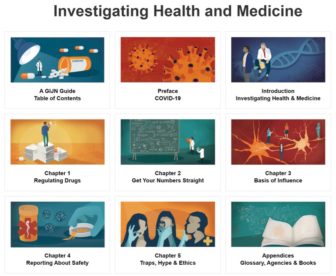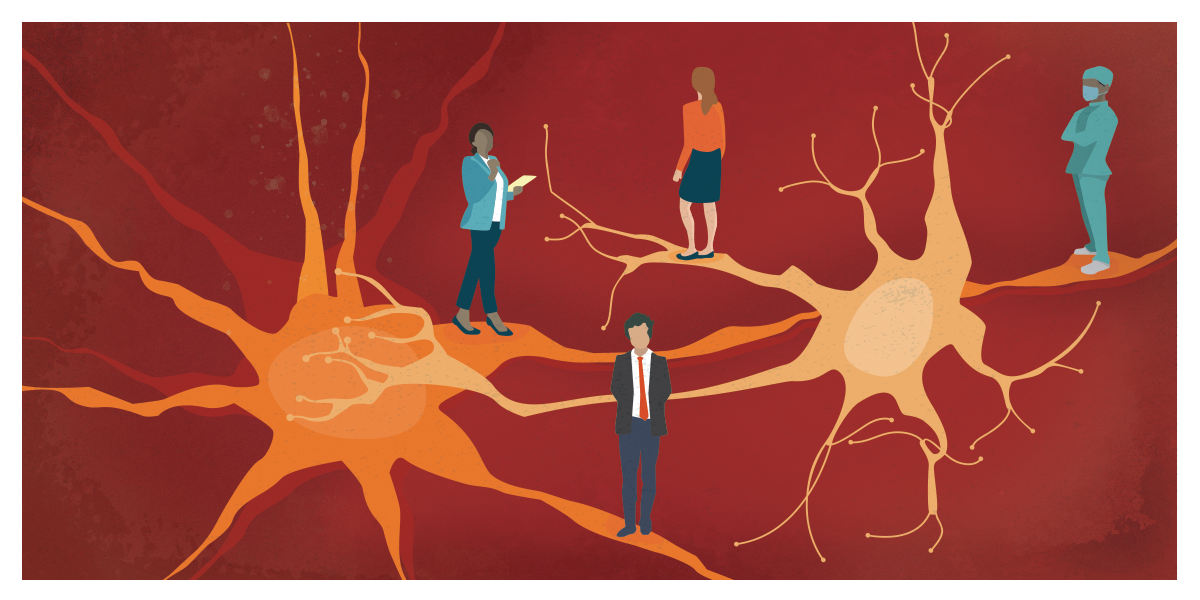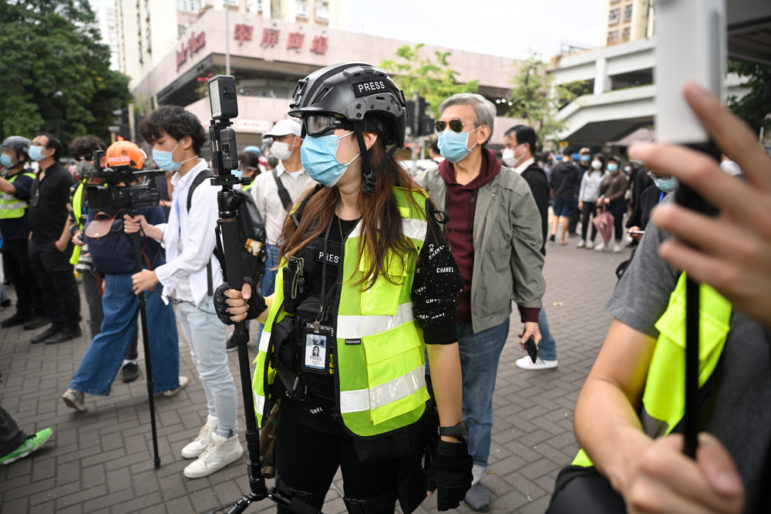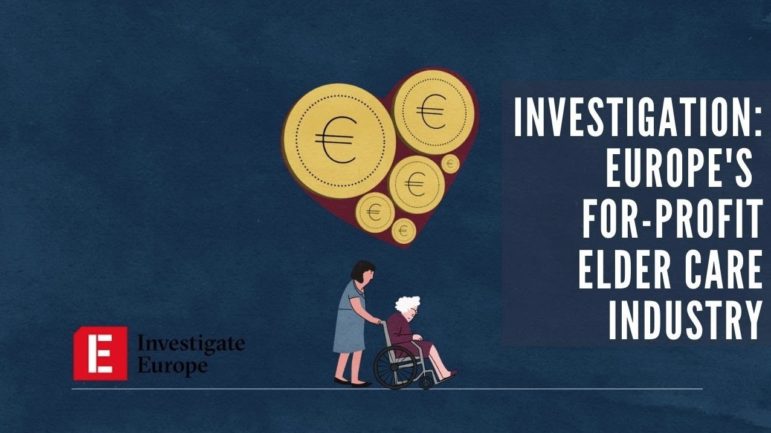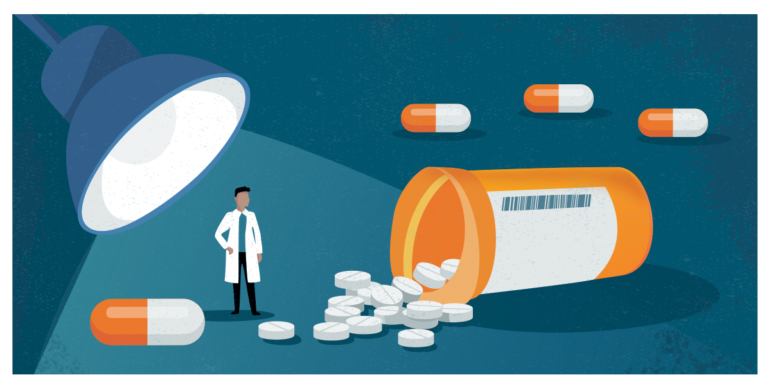

Top 10 Tips for Investigating Health Care, from the Experts
Read this article in
The COVID-19 pandemic has created a public health crisis without precedent in living memory. It has turned readers everywhere into vaccine news addicts, and made health care reporters out of journalists more used to covering court cases than medical trial results. The biggest story in the world for the last several months has been the coronavirus and the impact it has had on health, welfare, and the global economy, and journalists have been racing to keep pace and help audiences stay informed.
But GIJN is here to help. Today we launch a comprehensive new guide into investigating health care. Written by Catherine Riva and Serena Tinari, the founders of Re-Check.ch, a nonprofit organization that specializes in investigating and mapping health affairs, the guide provides a crash course for journalists to dig into the COVID-19 pandemic, vaccine and drug development, medical studies, corporate influence and conflicts of interest.
With more journalists reporting on the consequences for national health systems of a global pandemic and the efficacy of new drugs and vaccines, this is an essential toolkit. If you are a journalist covering health care, reading this could be the best two hours you invest this year. Download a PDF of the guide here.
As the authors of the guide themselves put it: “Investigating health care is complex and challenging. Reporting in this field means reading lengthy documents and getting well-acquainted with medical jargon. Numbers and statistics are also part of the game. Although the learning curve can be steep, in this specialized area of investigative journalism you’ll never run out of stories.”
As part of the Misinformation in Medicine Summit, GIJN will be hosting a free webinar on Saturday, November 21, entitled “Investigating Health and Medicine: Strategies and Tips for Better Reporting” and featuring the two authors of the report. On Thursday, December 3, we’ll host a second webinar, “Behind the COVID-19 Vaccine Race.” Please join us.
In the meantime, here are ten tips we’ve drawn from the guide to serve as an introduction:
- Beware of Oversimplification
Nothing is straightforward or simple in the current global situation. Be especially skeptical about information influenced by industry or relayed by governments. Take time to independently assess the evidence, cross-checking the information, and bearing in mind that conflicts of interest and complex agendas are ubiquitous in the field of health care. Comparing countries can be a difficult exercise and one prone to pitfalls, as differences and confounding factors might play a relevant role.
- Be Cautious about the Models
Early COVID-19 models were developed at a time when little data was available. Moreover, epidemics are non-linear and rather chaotic, making it even more difficult for any model to be predictive of what is going to happen.
- Stick to the Best Available Scientific Evidence
The global COVID-19 crisis is producing a huge volume of research, published at breakneck speed. Most of these studies are not going through the usual process of review. There is a lot of noise at the moment in the world of medical research, and it can be difficult for a journalist who doesn’t specialize in this field to make sense of it. When looking at a medical study, the gold standard is a randomized control trial. While these may not always be available, be conscious of the limitations of other study formats.
- Provide Context
Remember that any number makes sense only if put in context. For example, before suggesting that a COVID-19 metric or statistic is unusual or extraordinary, make sure to find out what a normal metric would be in the context of a viral infection, or its potential consequences for a patient’s health, or the way a symptom is normally addressed in any given hospital setting. Providing context is the only way to assess whether a phenomenon has really never been seen before, or is common in the world of health care.
- Draw on the Knowledge of a Wide Range of People, but Use Their Information Wisely
There are a wide variety of potential sources that you can use when covering health care: medical providers, regulators, trial research, patient groups, pharmaceutical industry insiders, and more. Speak to different experts: For example, it’s a good idea to discuss COVID-19 with infectious disease epidemiologists and vaccine safety epidemiologists, as they possess expertise specifically in the spread and management of major global health events.
But a word of caution: We tend to believe “the experts.” The longer their résumés, the more credibility we attach to their statements. But some of the industry leaders we instinctively trust most are often, at the same time, consultants for industry, the government, and international organizations such as the World Health Organization, so consider conflicts of interest.
- Don’t Fall for the Hype
The most common mistake reporters make is drawing the wrong conclusions from weak scientific evidence. And don’t forget that media and government messages have been emotionally charged throughout this crisis; investigative journalists should try to keep a cool head.
On this same subject, beware of media reports about health claims, which may be flawed, are often not evidence-based, and much of the time rely on government and industry press releases. Be sure to independently assess research claims.
- Understand Clinical Trials, the Different Stages, and What the Results Mean
Reporters must understand what the various levels of clinical trials can — and can’t — tell us. Be wary of announcements about scientific data made through press releases rather than via academic journal articles. Help your audience understand the limits of what’s known about vaccines. When searching clinical trials databases, take a closer look at the study design, the number of participants in the trial, what the grounds for inclusion and exclusion were, and if the results were published. Remember this comment, neatly put by Gary Schwitzer in his essential guide Covering Medical Research: “Not all studies are equal. And they shouldn’t be reported as if they were.”
- Question the “Bad Guy” Narrative
In this field, you may end up misreading — and thus misrepresenting — reality if you are looking for the usual “bad guy.” As soon you gain experience in this field, you realize this view is too simplistic. When you really dig, it will become apparent that many less obvious players, those who appear to be on the side of the patients, may also have their own, often complex, agendas.
- Question the Big Players
The pharmaceutical industry’s influence is pervasive, and medical marketing is skyrocketing. And there are also questions that should be asked about how much medication is helpful and what drugs might have other, negative impacts. Question everything, including the evidence published in medical journals.
The business model used by biomedical journals means content can be affected by advertising, and some journals rely on “reprints,” bulk printed copies of published studies that are paid for by the industry and used for marketing purposes.
- Hunt for the Red Flags
Take a close look at all the details of the approval process of a particular drug or vaccine. Assess if standards have been met and if the sponsor obtained any concessions — for instance, regulators may have allowed the company to show the drug’s efficacy not based on its effectiveness in addressing the main goal, but rather based on results in reaching a “surrogate endpoint” or “surrogate outcome.”
Check for side effects and question the approval process. In one case detailed in the guide, a scientist managed to get packaging for oranges approved as a vaginal mesh: proof that the processes don’t always work.
 Laura Dixon is GIJN’s associate editor and a freelance journalist from the UK. She has reported from Colombia, the US, and Mexico, and her work has been published by The Times, The Washington Post, and The Atlantic, among others. She has received reporting fellowships from the International Women’s Media Foundation and the Pulitzer Center for Crisis Reporting.
Laura Dixon is GIJN’s associate editor and a freelance journalist from the UK. She has reported from Colombia, the US, and Mexico, and her work has been published by The Times, The Washington Post, and The Atlantic, among others. She has received reporting fellowships from the International Women’s Media Foundation and the Pulitzer Center for Crisis Reporting.





